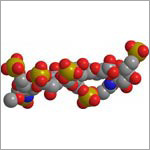This page is historical material reflecting the Feedback Loop Blog as it existed on
March 13, 2014. This page is no longer updated and links to external websites
and some internal pages may not work.
March 13, 2014
Scientists created a tailor-made form of the anti-clotting drug heparin that offers several advantages.
View larger image
The low molecular weight (LMW) form of the drug heparin is commonly used to prevent unwanted blood clots that can lead to heart attacks and strokes. It’s usually derived from pig intestines and normally cleared from the human body by the kidneys. In individuals with impaired kidney function, the drug can build up in the circulation and cause excessive bleeding. Impurities and the risk of contamination are also concerns with pig-derived heparin.
Now, Robert Linhardt of Rensselaer Polytechnic Institute and Jian Liu of the University of North Carolina at Chapel Hill have created a synthetic, tailor-made form of LMW heparin that offers several advantages over the animal-derived version, including alleviating the risk of contamination from natural sources. Studies in the test tube and in mice showed that the activity of this customized heparin molecule is easily reversible in cases of overdose or uncontrolled bleeding. And, since it is cleared from the body by the liver rather than the kidneys, this form of heparin would be safer for people with impaired kidney function. Additional research, including testing in humans, will be needed before this new version of LMW heparin can be considered for medical use.
This work also was funded by NIH’s National Heart, Lung, and Blood Institute.
Learn more:
Rensselaer Polytechnic Institute News Release 
University of North Carolina at Chapel Hill News Release
Linhardt Labs
Liu Lab


